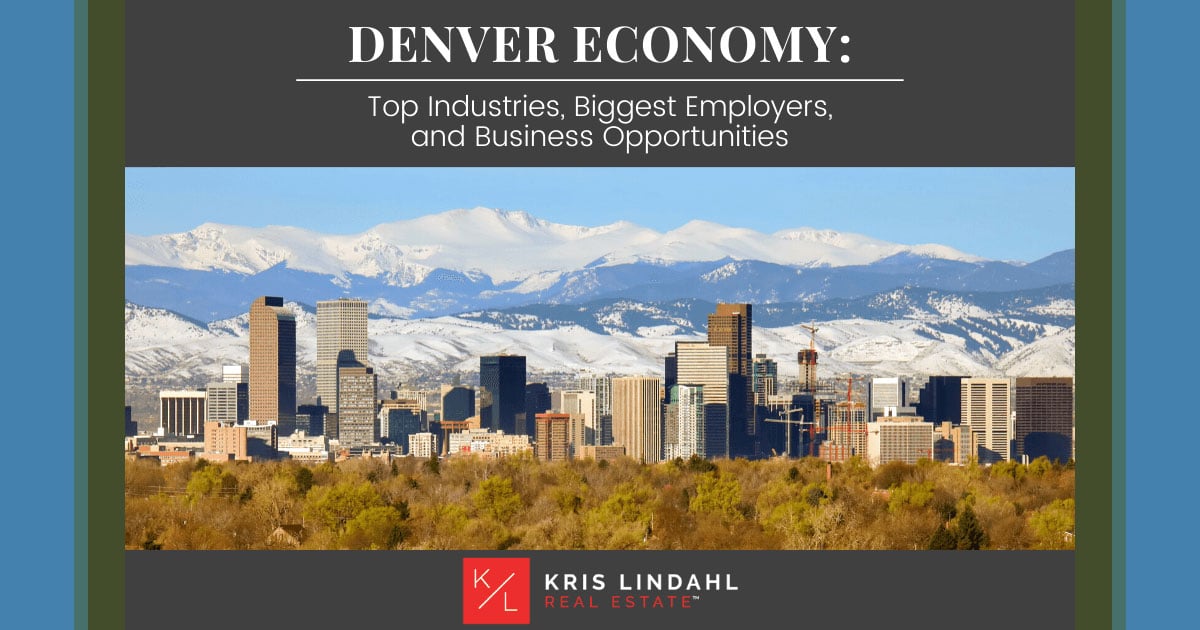
Best Jobs in Denver: A 2022 Guide to Local Economy & Business Opportunities

Denver is the largest city in Colorado, right in the South Platte River Valley. It is a vibrant big city that is home to over 715,000 people. The city spans some 155 square miles and provides a wide range of benefits for businesses, including good access to roadways and ample amenities for people looking to call it home. For those planning to move to Denver, whether to a Denver condo or one of the city’s luxury homes, it helps to know as much as possible about the Denver real estate market, top local employers employers, and facts about the economy as a whole. Here’s a look at some of the most important features of Denver’s economy.
Denver Industries
A wide range of industries is present in Denver. The Mile High City is home to a diversified economy that is not reliant on just one field or industry but on numerous opportunities. Some of the largest industries here include aerospace, telecommunications, health care, IT, energy, and financial services. Perhaps one of the most important industries in the area is the energy sector, which accounts for as much as $11.4 billion in revenue each year. It also employs 150,000 people.
#hw-pillar-chart-industry-denver#
Take a look at some of the other prominent industries present in the city:
- Professional, Scientific, & Technical Services: Research and professional development are a big part of the industry here. This category includes areas of IT development and cleantech, one of the city’s fastest-growing sectors. Over 61,200 people worked in this area in 2019 in the city of Denver.
- Health Care & Social Assistance: This industry sector accounted for over 55,600 jobs in Denver in 2019, including employment in the medical field and social services. The city’s growing health sector is helping to support this growth.
- Educational Services: Education is important in Denver, which shows in the number of people working in this field. In 2019, over 39,200 people were working in the educational service industry.
- Retail Trade: Retail, including all components of the industry, accounts for nearly 32,000 jobs in the city. This includes every component from the corporate retail sector through shopping malls and big box stores.
- Construction: There is a significant amount of growth in construction in Denver, including new residential and commercial spaces, warehousing, and various renovations. Construction of roads and other infrastructure projects is also essential here, accounting for nearly 31,000 jobs.
Other important industries include mining, quarrying, oil and gas extraction, forestry, and fishing. There are also opportunities in information systems in the city.
Top Industries in Denver
- Professional, Scientific, & Technical Services
- Health Care & Social Assistance
- Educational Services
- Retail Trade
- Construction
- Accommodation & Food Services
- Manufacturing
Top Employers in Denver
 Denver had 428,000 employees in 2019. From 2018 to 2019, it saw 2.35% growth in its employment sector. This is likely to grow further in the coming years.
Denver had 428,000 employees in 2019. From 2018 to 2019, it saw 2.35% growth in its employment sector. This is likely to grow further in the coming years.
Denver has many large employers, including companies that employ their whole staff from Denver residents and companies that have made Denver their headquarters. Take a look at some of these organizations:
- The Denver International Airport is one of the largest employers, with more than 35,000 people working within it, most of whom also live locally.
- HealthONE Corporation, a health care service provider, provides 11,050 employees with jobs in the region.
- Lockheed Martin, a government contractor of technology and services in the aviation and aerospace industry, is based out of the Littleton community 10 miles south of Denver, with over 14,000 employees.
- Centura Health, a national healthcare service provider with over 8,300 employees, calls the Englewood community near Denver home.
- SCL Health Systems, a healthcare and technology company, is based in Denver, with over 8,200 employees in the region.
Another large employer in Denver is the U.S. government, which has several offices in the area, including the Bureau of Reclamation, Bureau of Land Management, Office of Surface Mining and Reclamation, and the U.S. Department of Agriculture offices. The U.S. Mine Safety and Health Administration and offices for the Environmental Protection Agency are also located in Denver.
The state of Colorado also has a number of larger offices in the city, including the Division of Finance and Procurement, Office of the State Controller, Office of Administrative Courts, and the State Personnel Board, among others.
Denver Public Schools, Jefferson County Public Schools, and the University of Colorado Systems are also large employers in Denver. Additionally, the city is home to many small businesses, startups, and family-owned companies.
Additional Large Companies in Denver
- Century Link
- Kaiser Permanente
- United Airlines
- Wells Fargo
- Davita Healthcare Partners
Information via ChooseColorado.com
Denver Economy Facts and Figures
When looking at Denver as a potential new home, it can be helpful to learn more about the city’s economic health and other facts that play a role in the quality of life a person may expect here.
A good starting point is with jobs in the city. Denver is likely to see a significant jump in the job market from 2018 through the next 10 years. Experts anticipate this growing by as much as 45%, which is much higher than the national average of 33.5%. The current unemployment rate in Denver as of August of 2021 is 7.1%. This figure can often change, even as frequently as every quarter.
#hw-pillar-chart-economy-denver#
Denver charges a sales tax rate of 7.7%, a bit higher than the national average of 7.3%. There is also an income tax rate in the city of 4.8%, slightly higher than the national average of 4.6%. Tax rates can play a role in the overall affordability of any community.
It is also essential to take a look at income. The average income for a person living in Denver in 2019 was $34,423 a year, higher than the $28,555 national average. Also, those living in Denver had a median household income of $51,800, which is a bit lower than the $53,482 national average. Some of the highest hourly wages in the Denver area include software developers and software quality assurance analysts who earn $54.26 per hour. Civil engineers are also some of the most well-paid here, making $47.91 per hour. However, the highest-paid field is petroleum engineers, who earn $76.97 per hour on average.
Ready to Get to Work in Denver?
The more data a person has about the economy and job market in a community, the easier it is for them to feel good about purchasing one of the homes in that area. Denver is has a diversified economy with numerous job sectors present. That versatility and flexibility may provide access to a wide range of job opportunities in some fields. Those considering a home here may wish to carefully consider this data and the overall cost of living in Denver before making a purchase.
#hw-pillar-cta-bottom-denver#



